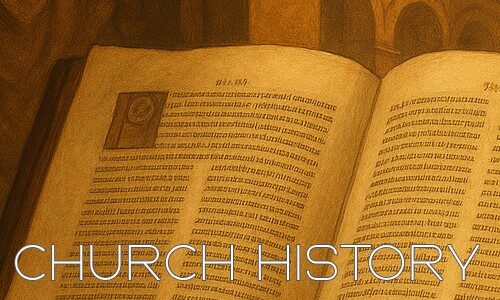This course traces the history of the Christian church from its beginnings to modern times. It helps students understand the development of Christian doctrine and how the Bible has been interpreted throughout different eras.
Church History
Level: Master’s
Course Length: 10 weeks (approx. 120–150 hours total if following full module path)
Delivery Mode: Competency-based, self-paced with required final exam
Course Overview
This course traces the history of the Christian church from its beginnings in the apostolic age to the present. It examines the development of Christian doctrine, key councils, reform movements, denominational diversity, and how the Bible has been interpreted across different eras. Students will gain an understanding of how cultural, political, and theological contexts shaped the church over two millennia.
The course is competency-based:
-
Students may complete all modules to prepare for the final exam, or
-
If they already have prior training in church history, they may skip directly to the final competency exam.
Competency is demonstrated through mastery of major events, figures, and theological developments.
Learning Outcomes
By the end of this course, students will be able to:
-
Trace the growth and spread of Christianity from the apostolic church to the modern era.
-
Identify key figures, councils, and movements that shaped church history.
-
Explain the development of Christian doctrine in various periods.
-
Evaluate how Scripture was interpreted across different eras.
-
Integrate historical understanding into theological reflection and ministry practice.
Weekly Breakdown (10 Weeks)
Week 1: The Apostolic and Early Church (30–100 CE) (8–10 hours)
-
Growth of Christianity in the Roman Empire.
-
Persecution and martyrdom.
-
Apostolic Fathers and earliest church writings.
-
Competency: Summarize the life of the early church under Roman rule.
Week 2: The Church Fathers and Early Councils (100–500 CE) (12–14 hours)
-
Apologists and theologians (Justin Martyr, Irenaeus, Athanasius, Augustine).
-
Ecumenical councils: Nicaea, Chalcedon.
-
Competency: Explain the role of councils in defining orthodoxy.
Week 3: The Medieval Church (500–1000 CE) (10–12 hours)
-
Rise of monasticism.
-
Spread of Christianity in Europe.
-
Papacy and church-state relations.
- Eastern Orthodox And Catholic Schism
-
Competency: Describe the church’s role in medieval society.
Week 4: High Middle Ages & Scholasticism (1000–1300 CE) (12–14 hours)
-
Crusades and cultural exchange.
-
Scholastic theology (Anselm, Aquinas).
- Heretical Movements: The Waldensians, The Cathars, The Petrobrusians, The Arnoldists
-
Competency: Identify key theological contributions of scholasticism.
Week 5: Late Medieval Developments (1300–1500 CE) (10–12 hours)
-
Corruption and calls for reform.
-
Mysticism and devotional movements.
-
Competency: Assess factors that led to the Reformation.
Week 6: The Protestant Reformation (1500–1650 CE) (12–14 hours)
-
Luther, Calvin, Zwingli, Anabaptists.
-
Catholic Counter-Reformation and Council of Trent.
-
Competency: Explain theological and institutional changes of the Reformation.
Week 7: Global Expansion and Confessionalization (1600–1800 CE) (12–14 hours)
-
Denominational formation.
-
Missionary expansion.
-
Enlightenment and rationalism.
-
Competency: Describe Christianity’s adaptation in global and intellectual contexts.
Week 8: The Modern Church (1800–1900 CE) (10–12 hours)
-
Revival movements and evangelical awakenings.
- American Christianity: Rise of American Evangelicalism, The Latter-Day Saint Movement, etc.
-
Liberal theology and biblical criticism.
-
Competency: Summarize 19th-century theological debates.
Week 9: The Contemporary Church (1900–Present) (12–14 hours)
-
Ecumenical movements.
-
Pentecostalism and global Christianity.
- The Rise of Television Evangelism And Mega Churches
-
Ongoing debates: fundamentalism, modernism, secularism.
-
Competency: Evaluate major global developments in modern church history.
Week 10: Integration & Competency Exam Prep (10–12 hours)
-
Review of themes: doctrine, mission, worship, Scripture interpretation.
-
Historical case studies.
-
Final Competency Exam (required).
Assessment
-
Competency Exam (100%): Students must demonstrate mastery of key figures, councils, movements, and theological developments across church history.
-
Optional formative assessments: reading summaries, reflection papers, and discussion questions (not required).
Curriculum
- 10 Sections
- 28 Lessons
- 10 Weeks
- Week 1: The Apostolic and Early Church (30–100 CE) (8–10 hours)Growth of Christianity in the Roman Empire. Persecution and martyrdom. Apostolic Fathers and earliest church writings.4
- Week 2: The Church Fathers and Early Councils (100–500 CE) (12–14 hours)Apologists and theologians (Justin Martyr, Irenaeus, Athanasius, Augustine). Ecumenical councils: Nicaea, Chalcedon.3
- Week 3: The Medieval Church (500–1000 CE) (10–12 hours)Rise of monasticism. Spread of Christianity in Europe. Papacy and church-state relations. Eastern Orthodox And Catholic Schism5
- Week 4: High Middle Ages & Scholasticism (1000–1300 CE) (12–14 hours)Crusades and cultural exchange. Scholastic theology (Anselm, Aquinas). Heretical Movements: The Waldensians, The Cathars, The Petrobrusians, The Arnoldists4
- Week 5: Late Medieval Developments (1300–1500 CE) (10–12 hours)Corruption and calls for reform. Mysticism and devotional movements.3
- Week 6: The Protestant Reformation (1500–1650 CE) (12–14 hours)Luther, Calvin, Zwingli, Anabaptists. Catholic Counter-Reformation and Council of Trent.3
- Week 7: Global Expansion and Confessionalization (1600–1800 CE) (12–14 hours)Denominational formation. Missionary expansion. Enlightenment and rationalism.4
- Week 8: The Modern Church (1800–1900 CE) (10–12 hours)Revival movements and evangelical awakenings. American Christianity: Rise of American Evangelicalism, The Latter-Day Saint Movement, etc. Liberal theology and biblical criticism.4
- Week 9: The Contemporary Church (1900–Present) (12–14 hours)Ecumenical movements. Pentecostalism and global Christianity. The Rise of Television Evangelism And Mega Churches Ongoing debates: fundamentalism, modernism, secularism.5
- Week 10: Integration & Competency Exam Prep (10–12 hours)Review of themes: doctrine, mission, worship, Scripture interpretation. Historical case studies.3
Instructor

